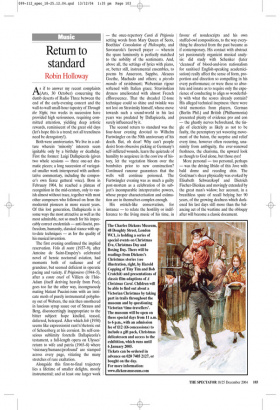Return to standard
Robin Holloway
As if to answer my recent complaints (Arts, 30 October) concerning the dumb deserts of Radio Three between the end of the early-evening concert and the wall-to-wall small-hour tapestry of Through the Night, two weeks in succession have provided high seriousness, requiring committed attention, yielding deep artistic rewards, reminiscent of the great old days (let’s hope this is a trend; not all trendiness need be derogatory!).
Both were anniversaries. We live in a culture wherein ‘minority’ interests seem ignitable only by a birthday or deathday. First the former: Luigi Dallapiccola (given two whole sessions — three one-act dramatic pieces; a long succession of variegated smaller work interspersed with authoritative commentary, including the composer’s own fierce guttural voice). Born in February 1904, he reached a plateau of recognition in the mid-century, only to vanish almost without trace, together with most other composers who followed on from the modernist pioneers in more recent years. Of this lost generation, Dallapiccola is in some ways the most attractive as well as the most admirable, not so much for his impeccably correct credentials — anti-fascist, profreedom, humanity, classical stance with upto-date techniques — as for the quality of his musical invention.
The first evening confirmed the implied reservation. Volo di notte (1937–9), after Antoine de Saint-Exupéry’s celebrated novel of heroic nocturnal aviation, had moments both of radiance and of grandeur, but seemed deficient in operatic pacing and variety. Il Prigioniero (1944–5), after a conte cruel of Villiers de l’IsleAdam (itself deriving heavily from Poe), goes too far the other way, incongruously mating blatant Puccini-isms with an intricate mesh of purely instrumental polyphony out of Webern, the mix then smothered in luscious syrup sauce out of Strauss and Berg, disconcertingly inappropriate to the bitter subject: hope kindled, teased, deferred, betrayed. After which Job (1950) seems like expressionist rant’n’rhetoric out of Schoenberg at his corniest. Its self-conscious sublimity foretells Dallapiccola’s testament, a full-length opera on Ulysses’ return to wife and patria (1965–8) where ‘visionary/humane/profound’ are stamped across every page, vitiating the many stretches of rare exaltation.
Alongside this first-to-final trajectory lies a lifetime of smaller delights, mostly instrumental; and at least one larger work — the once-repertory Canti di Prigionia setting words from Mary Queen of Scots, Boethius’ Consolation of Philosophy, and Savonarola’s farewell prayer — wherein the spare luminosity is perfectly matched to the nobility of the sentiments. And, above all, the settings of lyrics with piano, or, better still, instrumental ensembles, to poems by Anacreon, Sappho, Alcaeus Goethe, Machado and others; a piccolo mondo of ravishment; Webernian rigour softened with Italian grace; Stravinskian dryness ameliorated with almost French efflorescence. That the dreaded 12-tone technique could so shine and twinkle was not lost on Stravinsky himself, whose move towards such a sound-world in his last years was predated by Dallapiccola, and surely influenced by it.
The second return to standard was the four-hour evening devoted to Wilhelm Furtwängler on the 50th anniversary of his death. But, oh dear! Why can’t people desist from obsessive picking at Germany’s self-inflicted wounds, learn the quietude of humility to acquiesce in the com’era of history, let the vegetation bloom over the bombsites prior to new construction? Continued rancour guarantees that the wells will continue poisoned. The Furtwängler evening was as much a guilty post-mortem as a celebration of its subject’s incomparable interpretative powers, whose proper characterisation and estimation are in themselves complex enough.
His ostrich-like conservatism, for instance — to relate the hostility or indifference to the living music of his time, in favour of nondescripts and his own stuffed-owl compositions, to the way everything he directed from the past became as if contemporary. His contact with abstract yet passionately organicist musical analysis: did study with Schenker (later ‘cleansed’ of blood-and-iron nationalism for sanitised English-speaking academicisation) really affect the sense of form, proportion and direction so compelling in his every performance; or were these so absolute and innate as to require only the experience of conducting to align so wonderfully with what the scores already contain? His alleged technical ineptness: there were vivid memories from players, German (Berlin Phil.) and British (Philharmonia) presented plenty of evidence pro and con — the ghastly nerves beforehand, the tingle of electricity as likely as not to be faulty, the peremptory yet wavering movement of the baton, the surprise and relief every time, however often recurring, unanimity from ambiguity, the ever-renewed freshness, the charisma, the upward look as though to God alone, but those eyes!
More personal — too personal, perhaps — was the driving libido of this Jove with bald dome and receding chin. The God/man’s sheer physicality was evoked by Elisabeth Schwarzkopf and Dietrich Fischer-Dieskau and movingly extended by the great man’s widow; her account, in a breathless spate of recall belying her 90 years, of the growing deafness which darkened his last days still more than the balancing act of the wartime and the obloquy after will become a classic document.
The Charles Dickens Museum, 48 Doughty Street, London WC1, is holding a series of special events on Christmas Eve, Christmas Day and Boxing Day. There will be readings from Dickens’s Christmas stories (see illustration, right, by Harold Copping of Tiny Tim and Bob Cratchit) and presentations of classic film adaptions of A Christmas Carol. Children will be able to find out about a Victorian Christmas by taking part in trails throughout the museum and by questioning Victorian ‘time-travellers’. The museum will be open on these special days from 11 a.m. to 6 p.m., with an admission fee of £12 (£6 concessions) to include a gift pack, Christmas delicatessen and access to the exhibition, which runs until 6 January 2005.
Tickets can be ordered in advance on 020 7405 2127, or bought on the day.
For more information: www.dickensmuseum.com

















































































 Previous page
Previous page